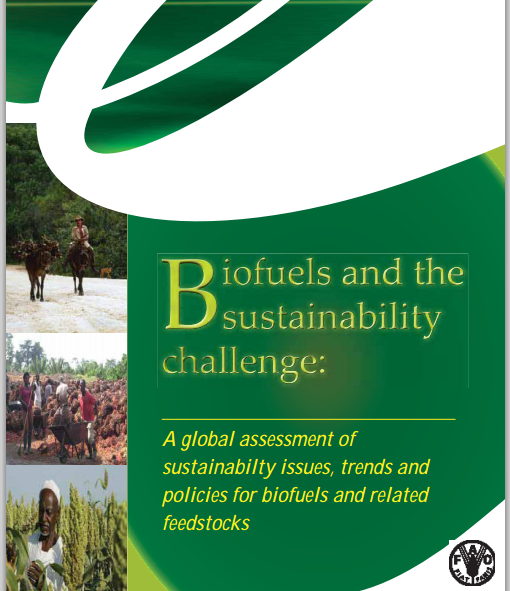Two new reports just came out for this year covering biofuels. This first one about the sustainability challenge concerning global biofuels is from the Food and Agriculture Organization (FAO) of the United Nations (UN).
 FAO released a report that addresses core issue of the sustainability (economic, environmental, social) of biofuels and related feedstocks worldwide. It reviews major certification initiatives, schemes and regulations in various countries including case studies covering a broad range of current biofuel-feedstocks systems.
FAO released a report that addresses core issue of the sustainability (economic, environmental, social) of biofuels and related feedstocks worldwide. It reviews major certification initiatives, schemes and regulations in various countries including case studies covering a broad range of current biofuel-feedstocks systems.
The report analyzes feedstock efficiency (in terms of biofuel yields per unit of land); long-term economic viability that depends on future policy support; technical innovations in biofuel systems; economics of biofuel supply and demand and tradeoffs between food and energy uses as well as feedstock productivity gains.
FAO noted that in poor developing countries, biofuel models that encourage small scale integrated bioenergy systems may offer higher rural development impacts. larger-scale biofuel projects may be suitable in those situations where countries have sufficient industrial capacity, besides land and biomass potential, and when these biofuel projects can be fully integrated into domestic energy strategies that do not conflict with food production potential and food security
It’s quite a comprehensive study, so just read the whole story on this link. [Call me lazy, maybe?]
Another one is a white paper about Waste-to-Biofuels Market from Renewable Waste Intelligence. According to the report, in order for biofuel consumption to increase significantly beyond current levels in the US, consumers and vehicle manufacturers must be persuaded to adopt new, more environmentally friendly gasoline blends.
 Automakers and consumers remain wary despite federal and state initiatives that are in place to encourage uptake, the report noted .
Automakers and consumers remain wary despite federal and state initiatives that are in place to encourage uptake, the report noted .
“Advanced biofuels manufacturers must demonstrate commercial capability and play catch-up to Environmental Protection Agency targets for production. While progress has been slower than initially hoped, the US government effectively reiterated its commitment to the ongoing development of the industry late last November, through denying a requested waiver of targets set out in the Renewable Fuel Standard. This sends a strong message of support to the emerging advanced biofuels industry. Looking ahead, the stage is now set for second-generation biofuels producers to demonstrate commercial viability to both investors and lawmakers.”
The report briefly analyzes economics of various feedstock such as corn, soybean oil, animal fats, agricultural residues and municipal solid waste. The quest, according to the report, is to find the most affordable feedstock.
You can download the white paper in this link (free registration). The 12-page market analysis was released for the incoming 3rd Annual Municipal Solid Waste to Biofuels and Bioproducts Summit to be held in Orlando, Florida, on February 20-21, 2013.



